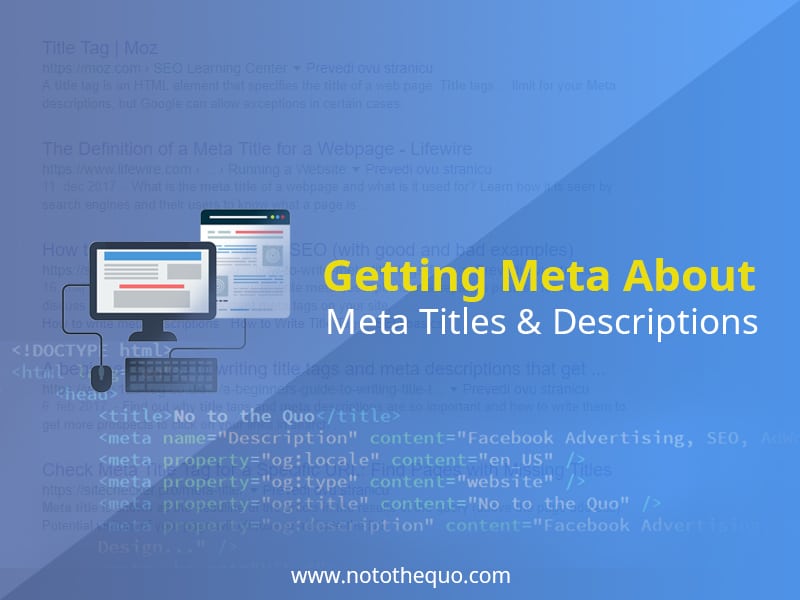Getting Meta About Meta Titles & Descriptions
Today, we’re talking about the one little part of SEO that everyone loves.
You guessed it: meta descriptions.
They’re just little blurbs, right?
They shouldn’t require much time or thought… right?
Well, the truth is, your meta titles and descriptions are crucial to how your webpages rank for your keywords and what your audience will see about your page when they use a search engine.
Let’s get meta and talk about what these things are, how they work, why they’re so important and quick tips you can use today to write more effective meta descriptions for search engines.
What are meta titles and descriptions?
Meta… what?
Here’s the deal: meta titles and descriptions sound a lot more intimidating than they actually are. Think of your meta descriptions as quick and easy summaries of your page’s content… because that’s exactly what they are.
Your meta titles and descriptions help users pick out your webpage in a sea of similar content. Your meta description is your chance to stand out and get noticed, so take advantage of it!
Why are meta titles and descriptions important?
You want to know the dirty little secret about meta descriptions? They don’t directly impact your webpage’s ranking.
But wait! They’re still really important because they help actual users — not just search engine spiders — determine what content is on your webpage and whether or not it can help them with their search query.
What’s more important than that, right?
That doesn’t mean you shouldn’t think about your keywords when writing your meta titles and descriptions, though. If the keywords the user typed into the search engine appear in your meta description, they’ll be bolded automatically, making it easy for readers to skim and scan a page of search results and zero in on your awesome content!
Besides, good meta titles and descriptions make your click-through rates (CTRs) go up, and CTR definitely has a huge — and direct — impact on your search ranking.
How do I write effective meta titles and descriptions?
Writing your meta title is easy — just use your content’s keyword-rich title — but writing your description can be a little trickier. Here are some basic tips for writing effective descriptions.
Length
There are a few different techniques for writing effective meta descriptions, but the most important — and perhaps the most challenging — is to be concise. Think about it: when you’re scrolling through a list of search engine results, you don’t have time to read through a lot of content. You just want to find what you’re looking for fast. Because meta titles and descriptions force you to be less wordy, users can quickly scan dozens of search results on several different pages in seconds.
So how long should they be? As search engines continue to change, the amount of space available for meta descriptions changes, too. Recently, Google doubled the length of search snippets, allowing you to include up to 320-character meta descriptions. Think about your meta descriptions as a little puzzle — you have a ton of really good information to share, but you have to figure out a smart way to say it all efficiently.
Incorporate Keywords
Next, stay focused on your keywords. As mentioned earlier, the keyword(s) — or keyword phrase(s) — you’re optimizing your webpage for should always be in your meta title and meta description. Mention the keyword or keyword phrase at least once, but don’t overdo it: filling your meta description with repeat keywords will take up too much real estate and it will make your description sound much less human. Remember, you’re writing content for other humans, so make it conversational. Pro tip: read everything you write aloud — if you’ve awkwardly packed too many keywords into your writing, you’ll pick up on it immediately.
Use Your Content
I know what you’re thinking: I’ve already written a 1,000-word blog post, and now I have to write even more for a meta description. Yes. That’s the short answer. But it doesn’t have to be that hard! You don’t have to create totally new content for your meta description. Just look at your piece of content and try to farm a quick and keyword-rich summary from there!
Sure, you might have to make some minor adjustments, but as you look through your content, you’ll probably find some virtually ready-made pieces for your meta description. Because meta descriptions are — more or less — summaries, look in your introduction and conclusion for a sentence or two that encapsulates your content’s main idea.
Meta titles and descriptions aren’t as scary as they sound, and getting really familiar with them and how to write them is key to making your content stand out in search engine results pages!
SEO Web Design No To The Quo



